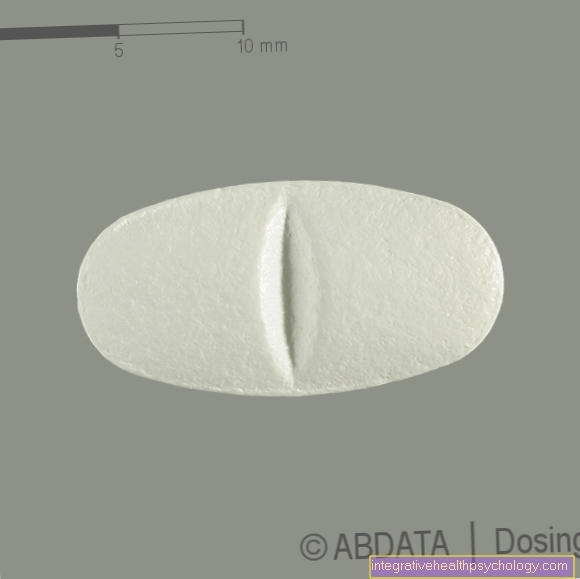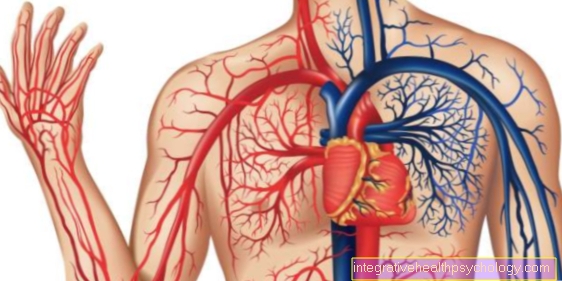Blood types
Synonyms
Blood, blood group, blood types
English: blood group
definition
The term "blood groups" describes various compositions of glycolipids or proteins (proteins) on the surface of the red blood cells (erythrocytes). These surface proteins act as antigens.
For this reason, incompatible foreign blood is recognized as foreign during transfusions and leads to the formation of so-called antigen-antibody complexes. These clump together (agglutinate) and can lead to dangerous vessel occlusions. The composition of these surface components is hereditary and can therefore be used to clarify relationships. The ISBT (International Society for Blood Transfusion) distinguishes 29 different blood group systems. The most important are the AB0 and Rhesus systems.
Read more on the topic:
- Blood transfusion
- blood
- Blood diseases
- Erythrocytes
- Rh system

AB0 system
General
The AB0 system of blood groups is the most important blood group system and comprises four groups:
- A.
- B.
- AB and
- 0
This system was set up in 1901 by Karl Landsteiner. In 1930 he received the Nobel Prize for the discovery of the AB0 system.
Function of the AB0 system
The different types of blood groups form different antigens on the surface of the red blood cells (Erythrocytes). This means that people with blood group A carry antigens of type A, blood group B carries antigens of type B on the surface of the erythrocytes. Blood group 0 persons do not carry antigens on the surface of the red blood cells, while blood group AB carries both types of antigens.
At the same time the body is forming antibody against the other surface components. Thus, people who Blood group A Antibodies to type B, while individuals have the Blood group B Have antibodies to type A. People in group AB do not have antibodies, whereas blood group 0 has both antibody types A and B.
The cause of the formation of antibodies are bacteria that invade our body during the first year of life. These have surface structures similar to those of the erythrocytes and, if they are recognized as “foreign”, lead to the formation of antibodies. Blood groups A and B are inherited dominantly over group 0. Types A and B are co-dominant among each other. Type 0, on the other hand, is inherited recessively compared to A and B. With this type of inheritance, blood group affiliation can be used to determine relationships.
Since the blood groups A and B can carry the genotype AA or BB as well as A0 or B0, it is more likely to carry one of these blood groups. On the other hand, people with blood group 0 can only carry genotype 00 and persons with blood group AB can only carry genotype AB.
Complications
The formation of different antigens depending on the predominant blood group can lead to blood group incompatibility in blood transfusions.
The reason for this is the antibodies formed against the "foreign" surface components of the erythrocytes. Thus, people of blood group A must never receive blood from people of blood group B, as this would lead to agglutinations and thus to blockages of all vessels. It can also destroy all Erythrocytes lead, this can end in death. Since blood group AB does not produce antigens, these people can receive blood transfusions of any other blood group. Whereas people with blood group 0 can always be a donor, but only receive blood from group 0.
frequency
Blood groups A and 0 are the most common blood types in the population. This applies not only to Germany, but also worldwide. Blood group B is a rarer blood group with 11% in Germany and 14% in Europe. However, the rarest group by far is AB. In Germany, these only carry around 5% of the population, in Europe it is around 6.5%.
Rh system
General
Just like that AB0 system of blood groups is that too Rhesus system one of the most important blood type systems nowadays. These are antibodies against blood components. The name comes from experiments with rhesus monkeys through which the rhesus factor was discovered by Karl Landsteiner in 1937.
Due to the already existing A and B of the blood group nomenclature for the previously discovered AB0 system, he continued this as C, D and E. Here is the Rh factor D. especially significant. This can be present in a person, so positive (D +), or not present and thus negative (d-) be. The rhesus factor is inherited dominantly, which is why the rhesus-negative blood group is rare.
Function of the rhesus system
Complications
The antibody against the Rh factor form only after contact with this, for example at Pregnancies or Blood transfusions. This means that in Rh-negative mothers it can lead to blood group complications in a second pregnancy. It is not the mothers but the fetuses that are at risk. Through contact between the fetal rhesus-positive blood of a fetus and the rhesus-negative blood of the mother, this forms antibodies against the rhesus factor. This does not cause any problems for the mother herself, as she does not have the appropriate antigens. However, if a new pregnancy occurs with a rhesus-positive child, the antibodies produced by the mother can destroy the erythrocytes of the fetus and thus cause the Hemolyticus neonatorum disease or even lead to death. This complication can be counteracted by exchanging blood. Nowadays, however, this is no longer necessary, as anti-D prophylaxis is carried out during the first pregnancy, which prevents the formation of antibodies.
Kell-Cellano system
The Kell system is the third most important blood group system. If the donor and recipient are incompatible, this also leads to a hemolytic transfusion syndrome and can be fatal.
For this reason, all blood donors in Germany and Austria are usually tested for the Kell antibody. About 92% of the population are Kell negative, about 7.2% are mixed blood and can receive Kell negative or positive blood. Only about 0.2% of the population are Kell-positive and require Kell-positive blood for blood transfusions. For this reason, Kell-negative blood can be used for transfusions by almost every patient. The Kell system is based on 34 previously known antigens that are encoded by genes on chromosome 7.
The Kell system also plays an important role in pregnancy and, like the Rhesus system, can lead to the mother's antibody formation and thus to dangers during a second pregnancy.
Read more on the topic: Rh intolerance
However, Kell intolerance occurs much less often than Rhesus incompatibility. Nevertheless, it is tested during pregnancy, along with other blood group tests. However, there is no prophylaxis available in the case of Rh incompatibility. For this reason, close monitoring of the pregnancy is indicated.
Duffy system
The Duffy factor of the blood groups is an antigen and at the same time a receptor for Plasmodium vivax. This is the causative agent of malaria. People who do not develop a Duffy factor are therefore resistant to malaria. Otherwise the Duffy system has no further important meaning.
Summary
The determination of the Blood group characteristics is one of the most important diagnostic tools to avoid transfusion problems. The most common and well-known systems are AB0- system and the Rh system. These are routinely determined in every child in western countries and are also known to most people. In addition to these two systems, there are about 28 other blood group systems, which, however, are less important in everyday use and are therefore not known. Individual systems, such as the Duffy system, can have positive effects on other diseases. Malaria resistance exists in the case of negative Duffy factor.














.jpg)














